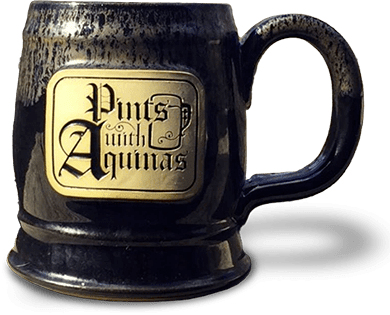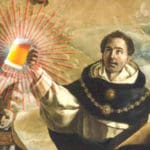Become part of the Pints With Aquinas community by supporting the show on Locals. Depending on the amount of your monthly gift, you’ll get access to some pretty awesome perks, from the “Morning Coffee” podcast to monthly spiritual direction videos from Fr. Gregory Pine!
Should These Books Really Be in the Bible?

Catholic Bibles are bigger than Protestant Bibles. That’s because we have seven more books. Called the Deuterocanonicals, they are: 1 and 2 Maccabees; Sirach; Wisdom; Baruch; Tobit; and Judith.
Catholics believe that these books are just as much a part of God’s Word as the rest of the Bible, while Protestants accuse us of adding these “human” books.
Some of our non-Catholic brothers and sisters claim that the New Testament never quotes the Deuterocanonicals with the phrase “It is written” or similar phrases Jesus often used to signal a passage from God’s Word.
Here’s how a Catholic should respond.
The New Testament formally quotes only a few books.
Many other books that Protestants accept as inspired are never cited in the New Testament, such as Ruth and Ezra. Does this mean they’re not part of Scripture? No Protestant would dare claim that.
Therefore, just because direct quotes from the Deuterocanonicals are not found in the New Testament does not mean they shouln’t be in the Bible.
There were many lists of books of Scripture back then.
Some Protestants point out that the Jewish leaders didn’t include the Deuterocanonicals in their Scripture. Since the Christian Bible grew from the Jewish Scripture, it seems we should follow our forefathers in faith, right?
There are two problems with this position. First, the Rabbis didn’t officially decide on all of the books of the Old Testament until somewhere around the early second century A.D., after Christianity already started. Second, different Jewish groups didn’t agree on what books should be included in Scripture. The Sadducees only accepted the first five books; other sects embraced some of the Deuterocanonicals.
The New Testament does allude to the Deuterocanonicals.
Here’s one example from Matthew 27:39-43:
“And those who passed by derided him [Jesus on the cross], wagging their heads and saying, “You who would destroy the temple and build it in three days, save yourself! If you are the Son of God, come down from the cross.” So also the chief priests, with the scribes and elders, mocked him, saying, “He saved others; he cannot save himself. He is the King of Israel; let him come down now from the cross, and we will believe in him. He trusts in God; let God deliver him now, if he desires him; for he said, ‘I am the Son of God.’”
This passage alludes to Psalm 22, which is in every Christian’s Bible. But it more strongly resembles one of the Deuterocanonicals, specifically Wisdom 2:17-18: “Let us see if his words are true and let us test what will happen at the end of his life; for if the righteous man is God’s son, he will help him and will deliver him from the hand of his adversaries.”
If the Jewish leaders rejected the Deuterocanonicals, why would they allude to a book that wasn’t really part of Scripture?
The Deuterocanonicals are the Word of God and a rich source of wisdom and inspiration. Let’s not cut God off when He wants to speak!
POPULAR POSTS

BROWSE OFFICIAL MERCH
FROM PINTS WITH AQUINAS
 Find this mug, apparel, books and more on the official Pints with Aquinas online store.
Find this mug, apparel, books and more on the official Pints with Aquinas online store.





